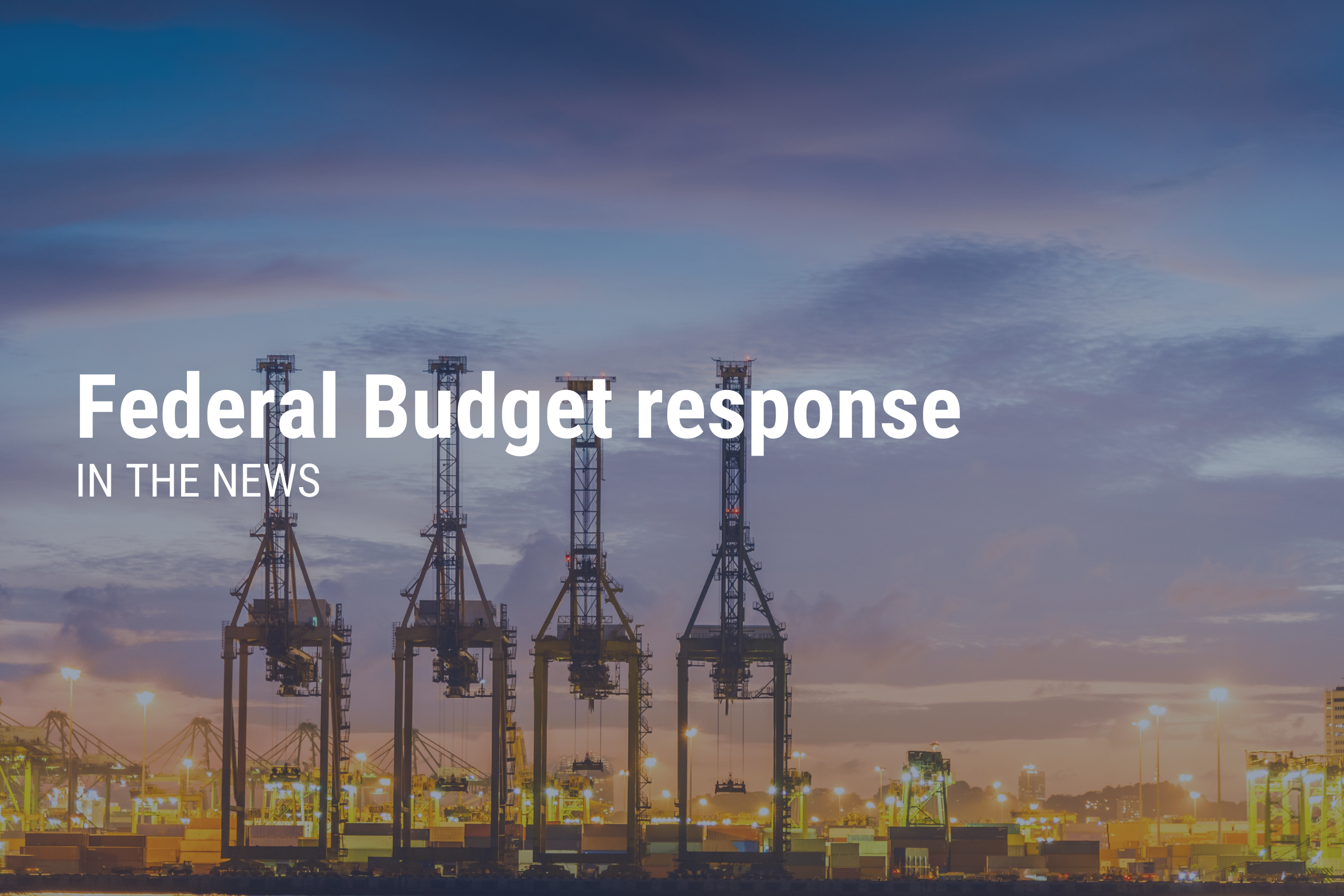
Featured, Media, News
UNGCNA’s Federal Budget response
Kylie Porter | May 4, 2022
UNGCNA says Federal Budget allocation is ‘a missed opportunity’ for the Morrison Government
The UNGCNA acknowledges the 2022-23 Federal Budget and its focus on measures to reduce the cost of living for households that are still feeling the pinch, and the assistance provided in support of conservation projects. However, the budget has missed the opportunity to “build back better” and create a longer-term vision for a sustainable and resilient economy that places climate action, human rights and anti-bribery and corruption at the core.
The 2022-23 Federal Budget has provided funding towards protection measures for the Great Barrier Reef, habitat restoration for threatened species and some investment in microgrids ($30 million), low-emission hydrogen ($20 million), carbon capture and storage ($20 million) and disaster relief ($6 billion). However, these measures alone will not support the decarbonisation of our economy that meets a net-zero target by 2050, and is silent on climate mitigation and adaptation measures.
UNGCNA Head of Programmes Corinne Schoch said: “The UNGCNA acknowledges the announcements made on projects including the Reef 2050 Plan and the funding on microgrids to support regional and remote communities. This includes $148.6 million over five years to encourage investment in “affordable and reliable power”. This is a good first step.”
“However, the Morrison Government’s focus on the here and now will not enable Australia to put in place long-term sustainable solutions that enable us to transition to a resilient economy. The UNGCNA urges the Government to review how it will meet its commitment to net-zero by 2050, including stronger investments in large-scale renewable energy infrastructure, and stronger incentives for households to participate in the green economy through subsidies for electric vehicles, solar and battery storage.
“The budget should also support setting ambitious intermediary climate targets that enable Australia to meet its path to decarbonisation. This starts with a review of Australia’s nationally determined contributions (NDCs) to ensure that they are in line with the Paris Agreement before COP27.
“As a wealthy nation, Australia has a responsibility to promote sustainable development in the Indo-Pacific region. This includes continuing to improve relationships with our Pacific Island neighbours. To achieve this, the UNGCNA expected to see a further increase in Official Development Assistance (ODA) that is closer in line with 0.7% of Gross National Income (GNI)1. This would also enable the Government to meet its commitment made in 2015 as part of the UN’s Agenda for Sustainable Development 2030.
“This is the Decade to Deliver. It is critical to ensure that Australia positions itself as a leading economy, based on principles of sustainable development. The Government has the opportunity ahead of the Federal election to demonstrate its strong intent towards reaching its 2030 commitment. This includes supporting a coordinated approach to decarbonisation and a just transition; establishing a smart mix of policies that support international frameworks like the UN Guiding Principles on Business and Human Rights; and committing to stronger governance mechanisms for global issues such as anti-bribery and corruption.”
With an upcoming election, the UNGCNA calls on the Federal Government-elect to consider the below recommendations in line with the 2030 agenda.
UNGCNA calls on the Government-elect to:
Achieve urgent and meaningful climate action (SDG13)
1. Set ambitious intermediary climate targets to support the path to decarbonisation: UNGCNA urges the Government to review its nationally determined contributions in line with the Paris Agreement before COP 27 in Cairo in December 2022. Meeting the 2050 net-zero target can only be achieved if initial targets for 2030 are in place.
2. Support a Just Transition with a National Fossil-Fuel Exit Plan: With some of Australia’s largest coal-fired power stations now closing early, like Origin Energy’s Eraring, AGL’s Lidell and Loy Yang, entire communities are at risk of socio-economic impacts such as job losses, regional economic losses and increasing mental health challenges. A national exit plan will incentivise businesses to create robust transition plans that support thriving local economies. In addition, UNGCNA urges the Federal Government to adopt the Just Transition Declaration:
- Ensure funds are allocated to support vulnerable workers, communities and regions in carbon-intensive economies
- Implement stronger incentives for business to operate in affected regions, prioritising green economies
3. Adopt a carbon price on carbon: Introducing a carbon price on carbon will enable Australia to remain competitive on the global stage as carbon border adjustment mechanisms are discussed in the EU and the UK. Additionally, the Government must provide incentives for businesses to decarbonise and invest in innovative technologies. Doing so will accelerate the achievement of net-zero emissions.
4. Invest into large scale renewable energy infrastructure: With the cost of oil and gas likely to increase and renewable energy prices continuing to drop, the UNGCNA urges the Government to include a budget for large-scale, renewable energy infrastructure including rail, electric vehicle infrastructure and an upgrade of Australia’s electricity grid that supports renewable energy security. The Government should also consider stronger incentives for households to participate in the green economy through subsidies for electric vehicles, solar and battery storage.
Protecting human rights (SDG8&10)
5. Funding to support the Customs Amendment (Banning Goods Produced By Uyghur Forced Labour) Bill 2020: Modern slavery, including forced labour, constitute serious crimes under Australian law and violate a person’s human rights and dignity. As such, it is critical that the Government table the bill in Parliament and ensure adequate funding is set aside to fulfil its recommendations once passed into law.
6. Review of the Modern Slavery Act: The Government must announce the timing and terms of the review of the Australian Modern Slavery Act, and ensure adequate funding is set aside to fulfil the recommendations from the review. This includes:
- Considering the relevant recommendations made by the Australian Law Reform Commission in their report on Corporate Criminal Responsibility that was tabled in Parliament on 31 August 2020
- Increasing funding for the Business Engagement Unit at Australian Border Force to enable Australia to meet its commitments under its National Action Plan to Combat Modern Slavery 2020-252, and ensure that the Unit has the capacity to continue to engage with businesses to reduce modern slavery and human trafficking, particularly in business supply chains
- Consulting with industry experts, business, the Australian Human Rights Commission, academia and civil society on changes to the Australian Modern Slavery Act that will position Australia as a leader in combatting modern slavery (SDG 8.7)
7. Continue to fund and give a greater voice to the Australian Human Rights Commission: In doing so, the Government will be in a stronger position to demonstrate its duty to protect human rights and uphold international frameworks on human rights including the UN Guiding Principles on Business and Human Rights.
8. Adopt a National Charter of Human Rights: Australia is one of few Western democracies that does not have a Charter of Human Rights, despite the ACT and Victoria both having charters. A Charter would help Australians understand their human rights and provide a standard from which to measure Government action. It would also act as a lighthouse on human rights for businesses.
A firm stance against bribery and corruption (SDG16)
9. Establish the Commonwealth Integrity Commission (CIC): UNGCNA is supportive of the Government’s commitment to establishing a CIC. Now, the UNGCNA is calling for the CIC to be prioritised and tabled in Parliament, taking into consideration the feedback received by the Attorney General’s Department and numerous stakeholders such as businesses and civil society.
10. Reintroduce and pass the Crimes Legislation Amendment (Combating Corporate Crime) (CLACCC) Bill 2019: If passed, the CLACCC bill would be the most significant shift in Australia’s anti-corruption landscape since foreign bribery offence was first introduced in 1999. The law reform presents an opportunity for corporations to be more responsible and accountable, ensuring they have adequate procedures in place to combat corporate corruption.
[1]As per SDG 17.2
[2] National Action Plan to Combat Modern Slavery 2020-25
For all media enquiries including interview opportunities with UNGCNA Executive Director Kylie Porter and/or Head of the Programmes Corinne Schoch please contact:
Miette Lelievre (0468 340 286) or Tess McDonald (0430 766 401), Thrive PR + Communications.




